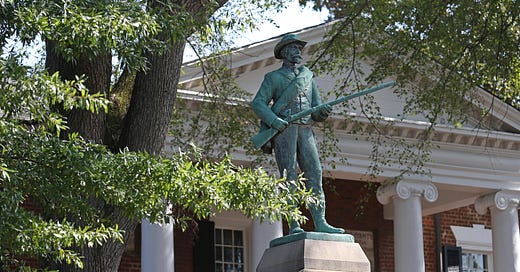Yesterday I spoke at the Springfield Museums in Springfield, MA about the history and current controversy surrounding Civil War monuments. We had a great turnout. The audience—both in person and online—was engaged and the Q&A was a real pleasure.
It’s so nice to be back doing in-person presentations.
One question in particular caught me by surprise. I don’t think I did a very good job responding to it and it’s been troubling me ever since.
I was asked if I believe that there is room for someone to disagree with the removal or relocation of Confederate monuments without being cast as a racist or white supremacist.
I suspect the question took me by surprise because the answer is so obvious. Of course it is possible. Unfortunately, there have been so few opportunities for good faith discussions about these complex questions.
Social media, especialy twitter, highlights and rewards divisiveness even among people who are interested in engaging others in productive ways. Mainstream media feeds on sensationalism and has little appetite for promoting examples of the hard work that is involved in creating spaces for serious discussion around these issues.
Of course, I should not have been surprised by the question given the current political climate. We have so few examples among our elected leaders to look toward as models of leadership.
Let me be clear. I am not suggesting that we necessarily be tolerant of all perspectives. I am not about to sit down with a white supremacist who defends what’s left of Confederate memory in public spaces, but I do want to listen and take seriously those individuals who hold positions different from mine.
It’s how we learn from one another and how we learn about the world around us.
I’ve gone on record regarding my position on Civil War monuments. I don’t believe that every Confederate monument needs to be destroyed or removed. Gettysburg National Military Park is as much a commemorative landscape as it is a historic battlefield landscape. The Confederate monuments are an opportunity to learn about Civil War memory.
I hope no one assumes the worst about me given this position, though I appreciate that my position may make some people uncomfortable. I am open to being shown where I am wrong and quick to shift my position when warranted. My views on this subject have evolved quite significantly since 2015 after considering a wide range of factors.
One of the points that I stress when I talk about Civil War monuments is that many of them were dedicated at a time when a significant number of Americans were disfranchised and unable to take part in discussions about how public spaces should be utilized to commemorate the past. In many cases these monuments were dedicated in counties and communities where more than half of the population was African American.
From day one many of these monuments failed to represent the collective values and shared past of the entire community.
We now have that opportunity to shape our public spaces in ways that are more representative of the entire community, but for it to have any chance of success we need to learn to listen and not assume the worst in one another.
Reminder: If you are a paid subscriber, you should have received an email from me that includes a zoom link for Sunday evening’s discussion of Clint Smith’s book, How the Word is Passed. We start at 7pm. Let me know if you didn’t receive the email, but check your spam folder first. Looking forard to seeing you.





It cannot be argued that for many people, the thought of trying to see or understand a perspective you feel is disingenuous, disrespectful and distressing is a hard sell. But the biggest problem is often in how that opposing perspective is delivered. Few people can hide their disdain on this particular issue, and on many others as well. That is not going to make anyone receptive to your POV. And frankly, if you do understand the whole of it, it creates a natural aversion to the opposing view. If you begin with, “Lincoln was a criminal” or “the north invaded” we are never going to find common ground because you disrespected me as your opening.
Thanks for sharing your experience, the question, and your response.
It's been my experience that for most questions, the answer is "it depends". Your answer gets at that certainly.
A challenge I have is sitting in the discomfort of hearing something that I think I disagree with or I think I am supposed to disagree with. Listening without judgement is a skill that is hard to practice, but I try to do it. I try to go to clarifying questions like "tell me more" (because there well may be a context or story that would help me understand the position). Sometimes I try to say back what I think I'm hearing to check in.
The more I think I'm hearing a strong, political stance or pole of an argument, the less comfortable I am in doing that. That's sometimes about personal comfort or perceptions of risk or safety. And sometimes it's about my evaluation of how much or how little the person is willing to listen to or to think about additional information or perspectives.
The hardest thing in the world is to say "I may be wrong" or "you may be right". It can sometimes be a tool for engaging and learning more. Other times it can be a way to break away (and return to my space where I will comfortably pass my judgements about myself and the other all day long).